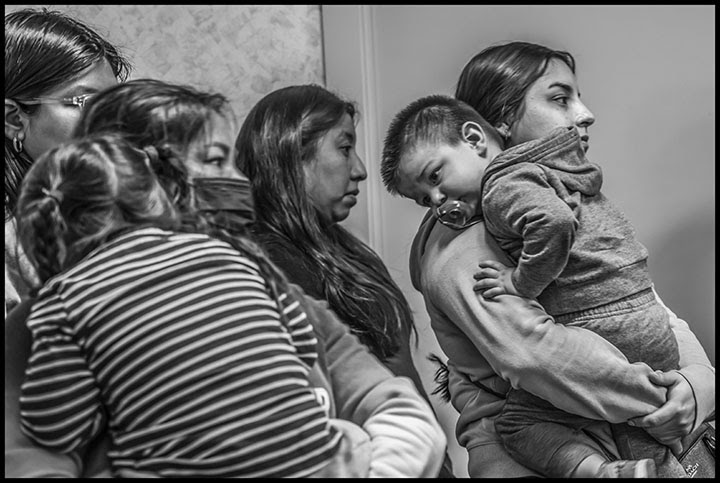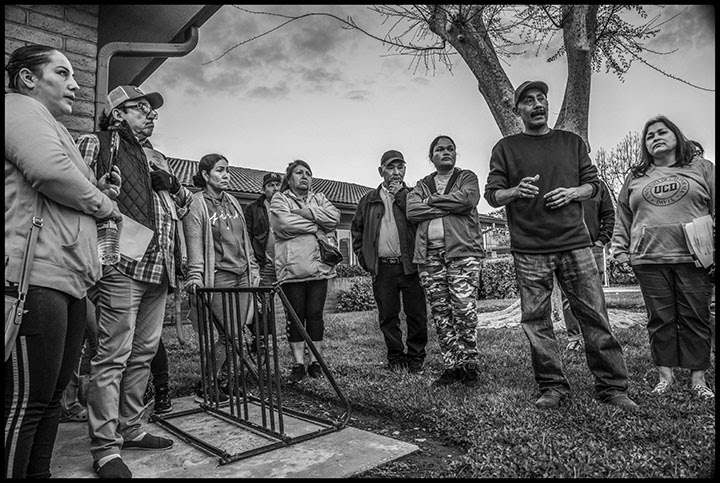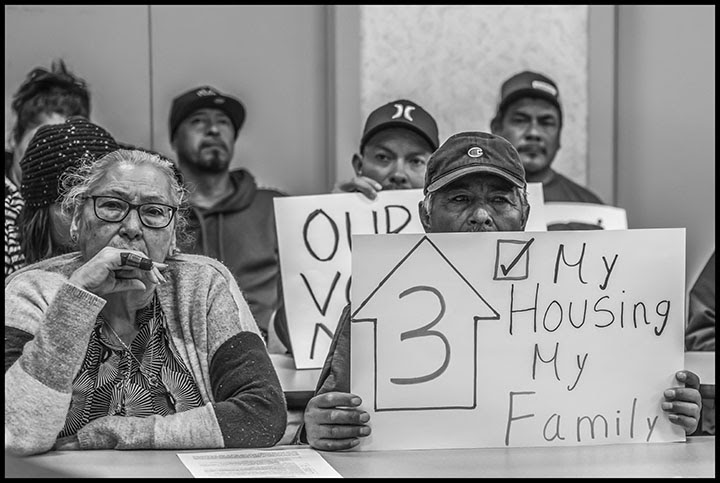
NO PAPERS? LOSE YOUR HOME!
By David Bacon
The Nation, 4/12/23
https://www.thenation.com/article/society/farmworker-camp-evictions/
https://davidbaconrealitycheck.blogspot.com/2023/04/no-papers-lose-your-home.html
Farmworkers in California labor camps see unprecedented rise in evictions. As growers bring in more H-2A workers, affordable housing for local farmworkers has become sparse.

Evicted farmworkers demand their homes back at a meeting of the Tulare County Housing Authority.
Lidia Torres got scared when the new eligibility clerk at the labor camp knocked on her door. She would have to come to the office, Vanessa Carter told her, and reverify the immigration documents she’d provided when she first moved in six years earlier. So Torres showed them to her. «She said my documents were not valid,» Torres remembers. «No one had ever questioned them before. Then she gave me three days to get out.»
Carter threatened to give Torres’ papers to a lawyer, even to a judge. «I said they were same as most people here in the camp. But then Vanessa said she was checking theirs too, and they’d have to leave as well. I thought she’d call the migra. If I made a fuss she said I’d have to pay thousands of dollars.»
The Linnell Farm Labor Center, where Torres lived, consists of one hundred ninety-one single story cinderblock apartments near Visalia, in the southern San Joaquin Valley. They’re scattered around a dusty playing field and children’s playground filled with weeds, behind a locked gate and fence. Torres’ rent was $513 a month for two bedrooms. Fearing that her problems could escalate, she found another place to rent for $1800 a month, and left.
Carter did as she’d threatened, and questioned the immigration documents of other families in the camp. In a March 23 email Ray Macareno[DB1][DB1], a member of the Board of Commissioners of the Tulare County Housing Authority (TCHA), said that 17 families received 3-day eviction notices, which threaten $600 fees and court and attorney costs for non-compliance. The notice, which residents were told to sign, says «You admitted to HATC staff that you do not have permanent residency and further admitted that you had provided HATC with fraudulent citizenship documents.»

Lidia Torres and other evicted farmworkers listen to Hector Hernandez of the Unidad Popular Benito Juarez, outside a meeting of the Tulare County Housing Authority.
Two community organizations, the Central Valley Empowerment Alliance (CVEA) and the Unidad Popular Benito Juarez (UPBJ), say they’ve gathered documentation[DB2][DB2] from over fifty families evicted or threatened with eviction from the Linnell and three other Tulare County camps. In February they held two community hearings, and then went to a board meeting to demand that the families be reinstated.
In a letter[DB3][DB3] to the commissioners, the organizations charge that housing authority personnel verbally abused residents, threatened them with calling immigration agents, disqualified them from Section 8 rent subsidies, and entered their homes without permission. They demanded that the board fire Ken Kugler, TCHA’s executive director, and reassign Carter and her superior, area manager Leticia Esparza. «This is a basic violation of peoples’ right to housing,» CVEA co-director Mari Perez told the board.
Similar enforcement actions could affect thousands of other farmworker families, far beyond Tulare County. «People have been telling us about evictions like this in other parts of the valley,» said UPBJ executive director Hector Hernandez in an interview. «It’s not visible, but it feels like a wave.» Increasing the potential for an eviction wave is a law passed during the Trump administration. An amendment to Section 514 (f)(3)(A) of the Housing Act of 1949 makes it possible for growers to use the nationwide system of farm labor camps, not for farmworkers who have worked and lived in the U.S. for years, but as barracks housing for contract temporary labor under the exploitative H-2A visa program.
Tulare County manages 495 units of housing for farmworker families in six labor camps, including Linnell. The U.S. Department of Agriculture provides funding both for construction of the camps and rent subsidies for residents. According to a USDA Rural Development spokesperson[DB4][DB4], families get rental assistance in 5,466 units in California, and in over 12,000 units nationwide.
To rent an apartment in one of the camps, a family member has to show that she or he works in the fields, meets USDA low-income guidelines, and is a U.S. citizen or legal resident. The camps are filled with farmworker families who reflect the demographics of the farm labor workforce. Nationally, the USDA estimates that over 40 percent of farmworkers don’t have legal immigration status, and that this is higher in California. The families living in camp apartments are often mixed, with some members having legal status and others without it.
Torres’ children, for instance, were born in the U.S. When Carter questioned her status, she asked that her son, living with her and attending college, sign the rental agreement instead. Carter said he’d have to go work in the fields to qualify. «I would never take him out of school and put him in the fields,» Torres told her.
In the workplace, farmworkers without papers face the same problem of showing documents about immigration status. Federal law, since 1986, has required employers to check workers’ papers before hiring them. In a workforce of 2.4 million nationally, hundreds of thousands of farmworkers provide what employers need, sometimes borrowing or buying the necessary ID’s. And it’s not just farmworkers. All of the estimated 11 million undocumented people in the U.S. have the same problem when they get hired.
According to the U.S. Customs and Immigration Services, however, once a permanent resident card (green card) is accepted by a prospective employer, future reverification is not required. Given the demographics, constant reverification in the fields would mean a million workers in agriculture losing their jobs.
USDA and Housing Authorities could follow the process established in employment law, where reverification is barred once the original documents showing legal status are accepted. There is no requirement for yearly reverification in the USDA-supported labor camps, written into the language of Section 514. And as Torres says, camp managers understand the reality, and in the past didn’t ask to reverify immigration papers once a family signed their first rental contract. As the years went by, tenants simply signed new rental agreements every year.
But suddenly, in Tulare County, the Housing Authority changed the rules.

Mario Padilla and Concepcion Vargas protest during a housing authority meeting.
Read more:
https://davidbaconrealitycheck.blogspot.com/2023/04/no-papers-lose-your-home.html
